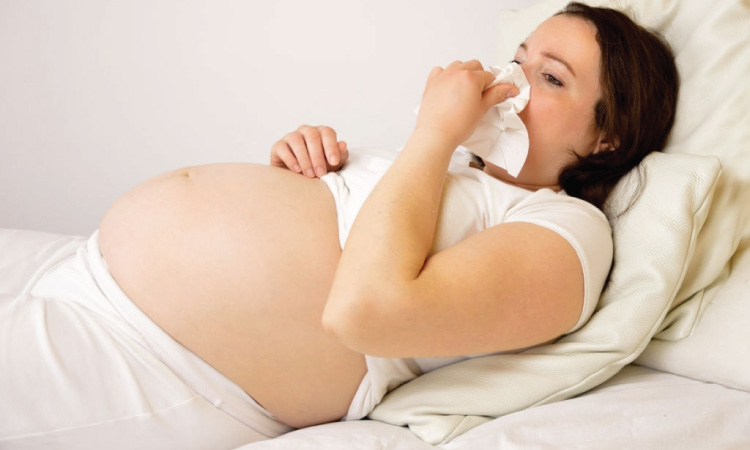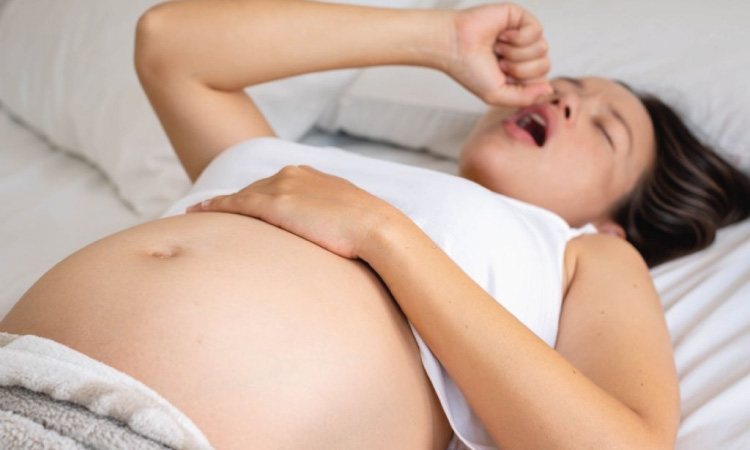Getting enough sleep is very important for the healthy progression of pregnancy. Yet, many women find it hard to get a good night’s sleep during pregnancy. Many factors contribute to sleep deprivation during pregnancy.
In this article let us find out some factors that bring about sleep deprivation during pregnancy.
What Causes Sleep Deprivation During Pregnancy.
Trouble sleeping during pregnancy is quite common. Various factors can act as sleep stealers during pregnancy. The factors that contribute to sleep deprivation during pregnancy can change with respect to the phase of pregnancy.
For example, if morning sickness (unlike the name indicates it can even appear during the night) and tiredness (mother may not be able to eat much during this time associated with it can be the reason for lack of sleep during early pregnancy. Breast tenderness and hot flashes also can contribute to trouble sleeping. Plus all that thinking about the baby and how things are going to work out can make you lose your sleep easily.
Related Reading: 11 Symptoms Of Not Eating Enough While Pregnant
As the pregnancy progresses many other sleep stealing factors contribute to sleep deprivation. Here are the top 8 causes of sleep deprivation during pregnancy.
1. Increased frequency of urination can cause sleep deprivation during pregnancy
Increased frequency of urination is one of the most common early symptoms of pregnancy. In a survey conducted among 2427 women, 83% of pregnancy-related sleep disturbances are due to frequent urination, Even though the expecting mothers start experiencing it during the early days of pregnancy itself, it may not be as strong as to hinder the sleep.
As the pregnancy progresses, the frequency of urination annoyingly increases. Middle-of-the-night bathroom runs contribute to sleep deprivation during the second and third trimester of pregnancy.
Calculate Due Date With LMP
Reasons: According to our panel gynaecologist Dr Ankita Patel Tayal, multiple factors contribute to frequent urination during pregnancy. Increased level of hCG, the pregnancy hormone which increases the blood flow to the pelvic area is one factor that increases the frequency of urination. The blood volume increases 50% during pregnancy. More blood to the kidney means more urine is produced.
Another important reason that contributes to frequent urination is the growing uterus that puts excessive pressure on the bladder and compresses it markedly. As the bladder can’t hold the normal quantity of urine as it normally does, the frequency of releasing it increases.
2. General discomfort can make you sleep less during pregnancy
Pregnancy is a time the body of a pregnant woman undergoes striking physical changes in a very short span of 9 months. Getting adjusted to these changes is not easy. Therefore, even without any complications, pregnancy is a time of general discomfort.
Even though this general discomfort can interrupt sleep throughout pregnancy, it more often hits the expecting mothers during their second and third trimester. With the growing abdomen, pregnant women find it hard to get a comfy position to sleep.
Besides, some restrictions like avoiding sleeping on the back and belly will affect inveterate back and stomach- sleepers. In fact, in a survey conducted among 2427 women, almost 80 percent of pregnant women were reported to have trouble sleeping due to not able to find a comfortable sleeping position.
3. Heartburn causes sleep deprivation

Heartburn is a universal issue for pregnant women. Even though pregnant women can experience it at any point of pregnancy, it more often disturbs them during the later stage of pregnancy.
Related Reading: 13 Indian Home Remedies For Acidity During Pregnancy
Likewise, even though pregnant women who are prone to heartburn could experience it at any time of day, it’s often found to aggravate at night when they are lying down. Heart burn during pregnancy can keep expecting women awake during the night.
Reason: Pregnancy hormones along with other muscles relax the lower esophageal sphincter muscle thereby pushing the stomach acids to the esophagus causing a burning sensation near the heart (hence the name heartburn). Besides, the growing uterus tends to push the internal organs to find the room. This can increase the severity of heartburn.
4. Pains and aches can make it hard to sleep during pregnancy
Pregnancy comes with a range of aches and pains. They usually start to appear during the second trimester and heighten during the third trimester. Back pain, leg cramps, and hip pain are some of the factors that contribute to sleep deprivation during pregnancy. All these pains can take a toll on the sleep of pregnant women.
Leg cramps
Leg cramps are pretty common during pregnancy and they usually hit during the night, thereby, interfering the sleep. Around one-third of pregnant women contract leg pain at some point of pregnancy. According to a study, around 80% of leg cramps happens during the night interrupting sleep.
Lower back pain
As the pregnancy progresses, the weight gain and loosening ligaments in the joints contribute to lower back pain. It usually starts towards the end of the second trimester and continues throughout the third trimester. Lower back pain can potentially interrupt sleep.
Hip pain
Hip pain can start at any point during pregnancy. However, it more often appears in the second and third trimesters. The pain can be dull or sharp, either way, it interferes with sleep. Pregnancy hormones loosen the ligaments that hold the joints, this contributes to hip pain. Increased pressure on the sciatic nerve, weight gain, and even poor posture can contribute to hip pain during pregnancy.
Related Reading: Excessive Sleeping During Pregnancy – Causes, And Remedies
5. Pregnancy rhinitis can cause sleep deprivation

According to research, 18 to 30% of pregnant women report having symptoms of pregnancy rhinitis. Pregnancy rhinitis is a condition in which the mucous membranes lining of the nose gets inflamed. This causes nasal congestion.
This more often happens as more mucus is produced as a result of the flooding pregnancy hormones and also because of the increased blood flow (as a result of increased blood volume) to the nasal passage. Even though pregnancy rhinitis is a minor issue, it can disrupt sleep.
6. Restless leg syndrome (RLS)
RLS is a condition characterized by an irresistible urge to move the legs. Studies have found that the RLS occurs in about 10 to 34% of pregnant women. More often pregnant women experience RLS during the third trimester. It is one of the major causes of sleep deprivation during pregnancy.
Related Reading: 12 Important And Practical Tips For Normal Delivery
7. Baby moving and kicking can make it tough to sleep during pregnancy
From around the 20-week of gestation, the mothers start to feel their baby move. Babies have a tendency to go to the sleeping mode when the mother is active and switching to active mode when the mother is sleeping. Therefore, babies start to move a lot during the night. This can interrupt the mother’s sleep.
8. Insomnia
Any of the above-explained factors or anxiety or worries associated with labor and delivery, or fear about dealing with the little one after delivery can contribute to insomnia during pregnancy. Not able to sleep well during the night can bring about extreme tiredness that interferes with daily activities and contributes to excessive daytime sleepiness
How Does Sleep Deprivation Affect Pregnancy?

Inadequate sleep during pregnancy can adversely affect the health of the expecting mother. It can also bring about many serious maternal complications that affect the trouble-free progression of pregnancy.
Here are some of the serious consequences of sleep deprivation during pregnancy based on scientific studies.
- Lack of sleep in late pregnancy can influence the duration of labor and the kind of delivery. They discovered that women having less than 6 hours of sleep per night during the last month of pregnancy can have longer labor and also more pain and discomfort during labor
- The rate of cesarean births is also found to increase among the mothers who experience sleep deprivation during pregnancy
- Inadequate sleep throughout pregnancy even, if it is a lack of one hour, can contribute to preterm labor
- The sleep the pregnant woman gets in her first trimester can influence her health in the third trimester. Women who don’t get adequate sleep in the first trimester are nearly 10 times more at risk to develop preeclampsia late in pregnancy
- Insufficient total sleep or the breaking up of deep sleep can adversely affect the quantity of growth hormone released. This can lead to developmental or growth problems in the unborn baby
- Lack of sleep during pregnancy increases the risk of post partum depression.
FAQ’s
Doctors recommend 8 to 10 hours of uninterrupted sleep for a pregnant woman. However, this is not always possible. Hence even if you are not able to sleep for 8 to 10 hours, aim to spend that much time in bed then you might end up with 7 hours of good sleep.
Getting adequate sleep during the first trimester is very important. Sleep deprivation during pregnancy can increase the risk of gestational diabetes, high blood pressure during the third trimester. It can also contribute to depression and stress during pregnancy.
The second trimester is your best bet to get an adequate sleep. Neither the morning sickness nor the physical changes bother you much during this phase. Lack of sleep during pregnancy second trimester is linked to gestational diabetes, preeclampsia, and preterm delivery.
Lack of sleep during pregnancy third trimester can create complications during delivery. According to one study, pregnant women who slept less than 6 hours towards the end of pregnancy can have longer labors and an increased chance of cesarean deliveries.


